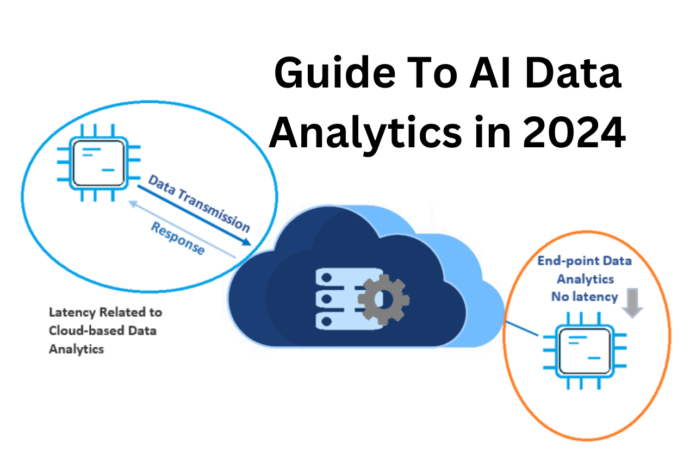AI Data Analytics plays a crucial role in shaping business strategies and enhancing operational efficiency, serving as a key component in decision-making processes within the contemporary corporate landscape. In an age of digital dominance, organizations can have access to vast amounts of data, covering a wide range of metrics, including consumer behavior, market trends and performance. The intricate task of integrating and analyzing data from various sources presents a notable challenge, making it increasingly complex for companies to distill this data into actionable insights. Conventional analytical approaches often struggle to keep up with the magnitude and intricacy of today’s data environments, resulting in inefficiencies and missed opportunities.
Thank you for reading this post, don't forget to subscribe!Now, consider the game-changing impact of Artificial Intelligence (AI). The rapid advancement of AI technology has transformed the realm of AI Data Analytics, providing unparalleled capabilities for data processing, pattern recognition, and predictive analysis. Let’s learn how AI is revolutionizing data analytics and explore some of the top AI data analytics tools in 2024 available for your consideration.
What is AI Data Analytics?
AI Data Analytics involves the utilization of Artificial Intelligence (AI) and Machine Learning (ML) algorithms to analyze large volumes of data. This innovative method goes beyond traditional data analysis by harnessing AI capabilities to automatically extract insights, identify patterns, and forecast future trends using historical data. The process comprises various essential elements:
Data Preprocessing: Prior to conducting any analysis, it is essential to clean and organize the data. AI algorithms have the capability to automate this process by handling missing values, outliers, and inconsistencies, ensuring that the data is accurate and prepared for analysis.
Predictive Analytics: A distinguishing characteristic of AI Data Analytics is its capacity to predict future outcomes. By examining historical data, AI can make well-informed forecasts regarding future trends, customer behaviors, market movements, and potential risks, providing businesses with a strategic advantage.
Machine Learning Models: ML models lie at the core of AI Data Analytics, as they are trained on historical data. These models are specifically designed to identify patterns and relationships among various data elements, continuously learning from each interaction to enhance their predictive accuracy over time.
Natural Language Processing (NLP): AI Data Analytics frequently incorporates NLP to analyze textual data, such as customer reviews or social media posts. This integration allows for a deeper understanding of consumer sentiments and preferences, providing valuable insights.
Data Visualization: AI tools also have the capability to generate intuitive visual representations of data, simplifying the interpretation of complex datasets for analysts and facilitating effective communication of their findings to stakeholders.
The integration of AI into data analytics has extensive applications across diverse industries. For example, in healthcare, AI can predict disease outbreaks or patient outcomes. In finance, it can detect fraudulent activities or forecast market trends. Retail companies utilize AI Data Analytics to comprehend customer behavior and personalize marketing strategies.
Top 10 AI Data Analytics Tools
- Qlik
- Akkio
- Looker
- Sisense
- Tableau
- Databricks
- DataRobot
- Salespanel
- Polymer Search
- Microsoft Power BI
Let’s know about Top 10 AI Data Analytics Tools–
Qlik
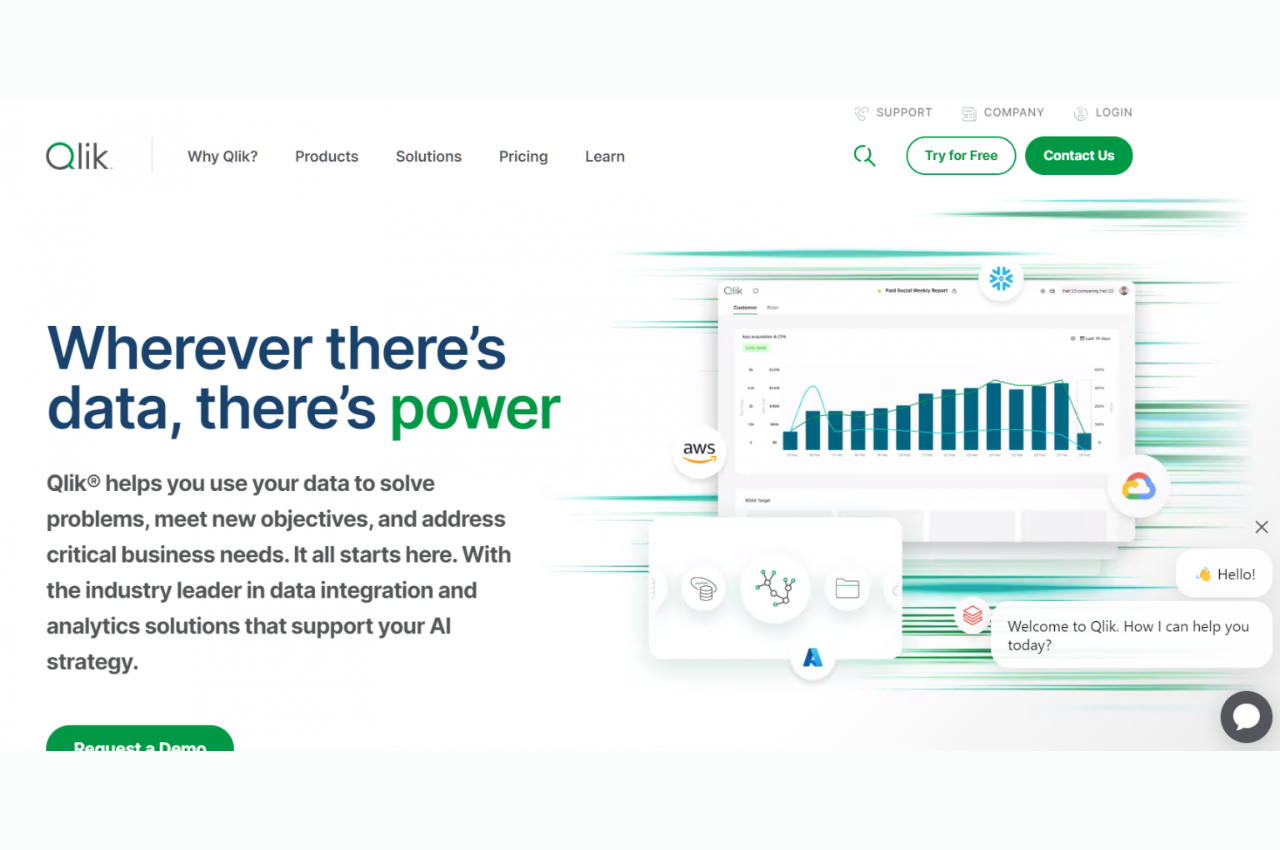 Qlik Sense revolutionizes modern analytics by providing AI-driven insights and predictions to users of all levels, facilitating informed decision-making based on data analysis. Its innovative associative analytics engine allows for unparalleled data exploration and insight discovery, surpassing traditional query-based analytics and dashboards by enabling instant calculations and data associations for seamless data navigation and insight discovery.
Qlik Sense revolutionizes modern analytics by providing AI-driven insights and predictions to users of all levels, facilitating informed decision-making based on data analysis. Its innovative associative analytics engine allows for unparalleled data exploration and insight discovery, surpassing traditional query-based analytics and dashboards by enabling instant calculations and data associations for seamless data navigation and insight discovery.
Qlik Sense is renowned for its augmented analytics features, incorporating AI and machine learning (ML) to offer a wide range of capabilities accessible to users of varying technical backgrounds. These features include automated insight generation, natural language interaction, AI-assisted data preparation and creation, as well as AutoML and predictive analytics, democratizing data analysis and enhancing the potential for actionable insights.
Additionally, Qlik Sense emphasizes the importance of intelligent decision-making in real-time by combining real-time data pipelines with action-oriented functionalities. This approach allows organizations to swiftly respond to business events through intelligent alerts, automation, embedded analytics, and mobile capabilities, ensuring that decisions are based on the most up-to-date data available.
Akkio
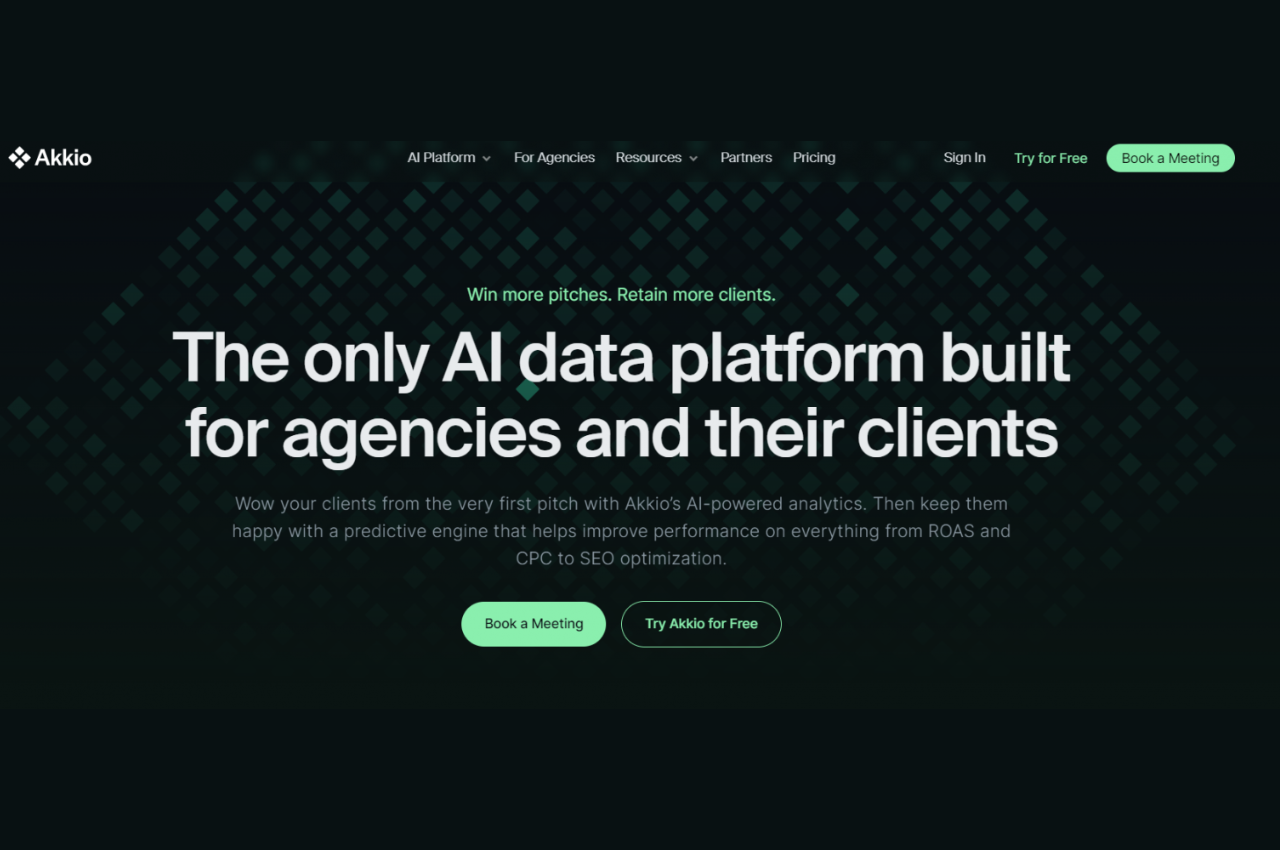 Akkio offers a user-friendly AI data analytics tool that caters to a wide range of organizational needs, from data analysts to marketing and operations teams. By simplifying data preparation, prediction, and forecasting, Akkio enhances efficiency for users and their clients. With innovative features like Chat Explore™, forecasting, generative reports, and Chat Data Prep™, Akkio aims to streamline the analytics process and make predictive analytics more accessible.
Akkio offers a user-friendly AI data analytics tool that caters to a wide range of organizational needs, from data analysts to marketing and operations teams. By simplifying data preparation, prediction, and forecasting, Akkio enhances efficiency for users and their clients. With innovative features like Chat Explore™, forecasting, generative reports, and Chat Data Prep™, Akkio aims to streamline the analytics process and make predictive analytics more accessible.
The platform stands out in data processing, pattern recognition, predictive analytics, and automation, empowering businesses to uncover insights and make informed decisions swiftly. Akkio is particularly valuable in industries such as retail, healthcare, finance, and manufacturing for tasks like demand forecasting, diagnostics improvement, fraud detection, and predictive maintenance.
Akkio’s no-code approach to machine learning (ML) democratizes AI analytics, opening up advanced data analysis to non-technical users. With features like Chat Data Prep and extensive integrations, data handling becomes simpler, allowing for the easy creation of predictive models and actionable insights. This collaborative effort between AI tools and human analysts is geared towards driving improved business decisions.
Looker
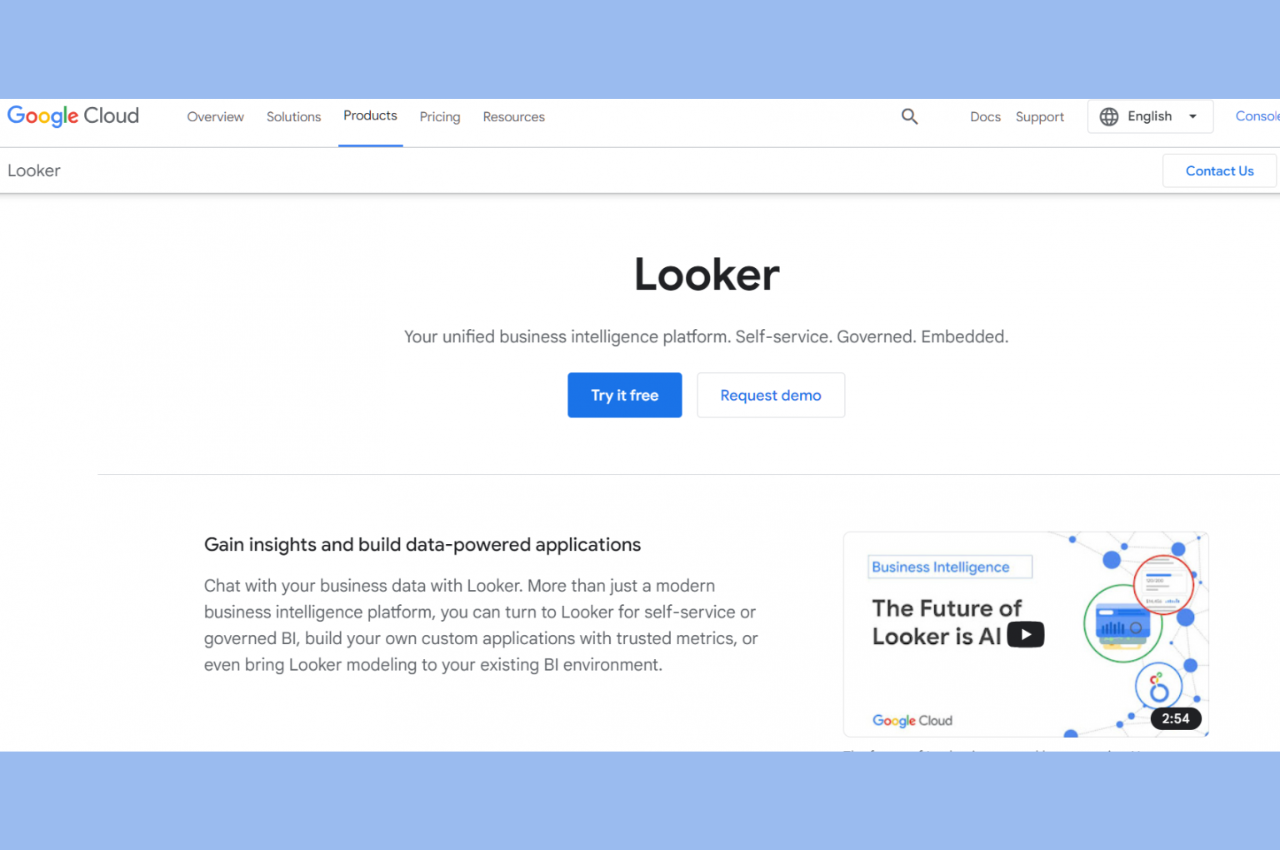 A fundamental element of Google Cloud’s analytics suite, Looker transforms the manner in which businesses utilize their data. By utilizing LookML for semantic modeling, it guarantees data governance and consistency throughout an organization. Looker’s ability to access real-time data enables dynamic decision-making, while its user-friendly interface fosters a collaborative analytics environment. The platform’s objective is to democratize data insights, enabling users with varying technical abilities to generate reports and analytics. It effectively addresses challenges such as data silos, ensuring that data remains centralized, accessible, and actionable. This makes Looker an excellent option for industries seeking to harness analytics in digital marketing, sales, operations, customer insights, and financial planning.
A fundamental element of Google Cloud’s analytics suite, Looker transforms the manner in which businesses utilize their data. By utilizing LookML for semantic modeling, it guarantees data governance and consistency throughout an organization. Looker’s ability to access real-time data enables dynamic decision-making, while its user-friendly interface fosters a collaborative analytics environment. The platform’s objective is to democratize data insights, enabling users with varying technical abilities to generate reports and analytics. It effectively addresses challenges such as data silos, ensuring that data remains centralized, accessible, and actionable. This makes Looker an excellent option for industries seeking to harness analytics in digital marketing, sales, operations, customer insights, and financial planning.
Sisense
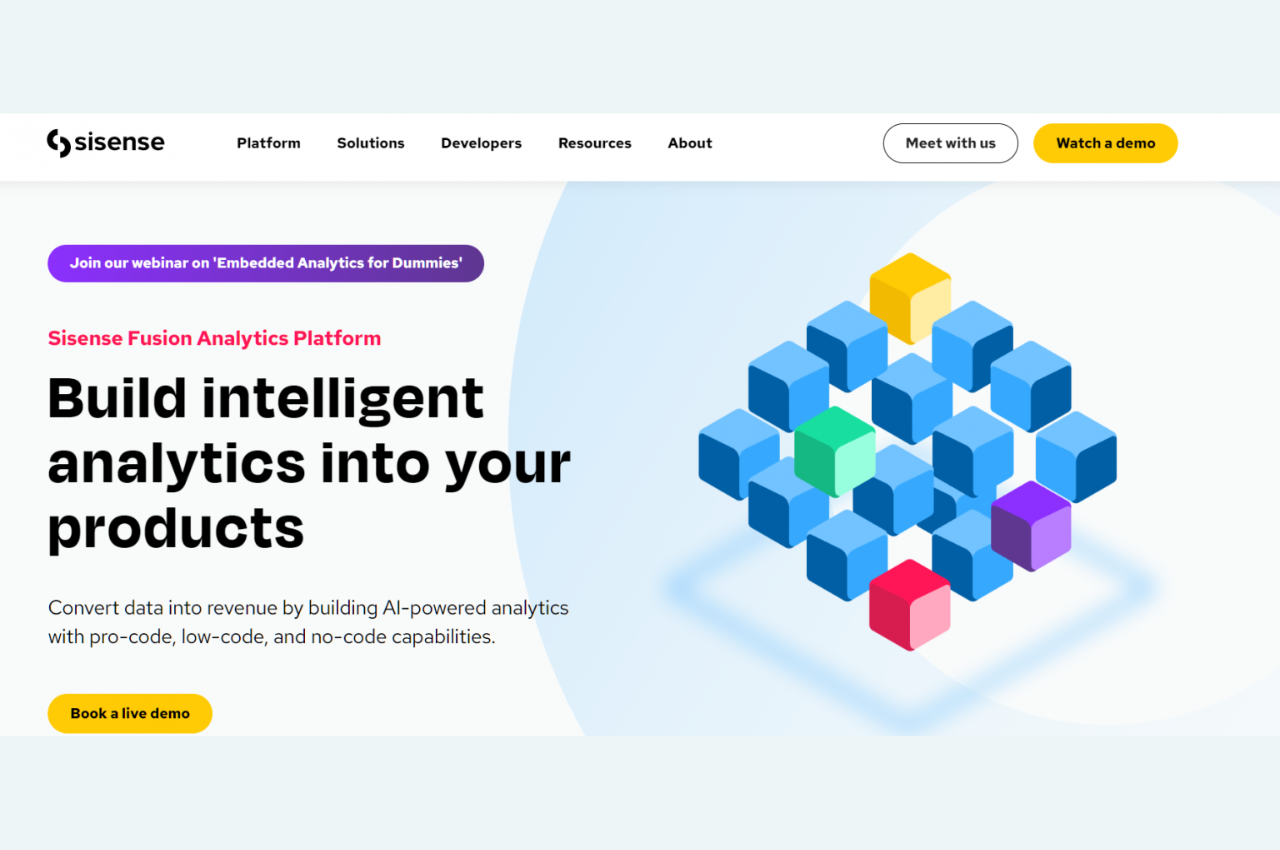 Sisense stands out with its comprehensive BI solution that enables organizations to streamline intricate datasets, transforming them into valuable insights. Renowned for its strong integration features, it effortlessly links with various data sources to develop detailed, interactive dashboards and reports. This software is crafted to democratize data analytics within a company, promoting a climate of well-informed decision-making. Sisense’s BI analytics methodology is especially advantageous for businesses managing complex data landscapes, necessitating a versatile and robust tool for data visualization and interpretation.
Sisense stands out with its comprehensive BI solution that enables organizations to streamline intricate datasets, transforming them into valuable insights. Renowned for its strong integration features, it effortlessly links with various data sources to develop detailed, interactive dashboards and reports. This software is crafted to democratize data analytics within a company, promoting a climate of well-informed decision-making. Sisense’s BI analytics methodology is especially advantageous for businesses managing complex data landscapes, necessitating a versatile and robust tool for data visualization and interpretation.
Tableau
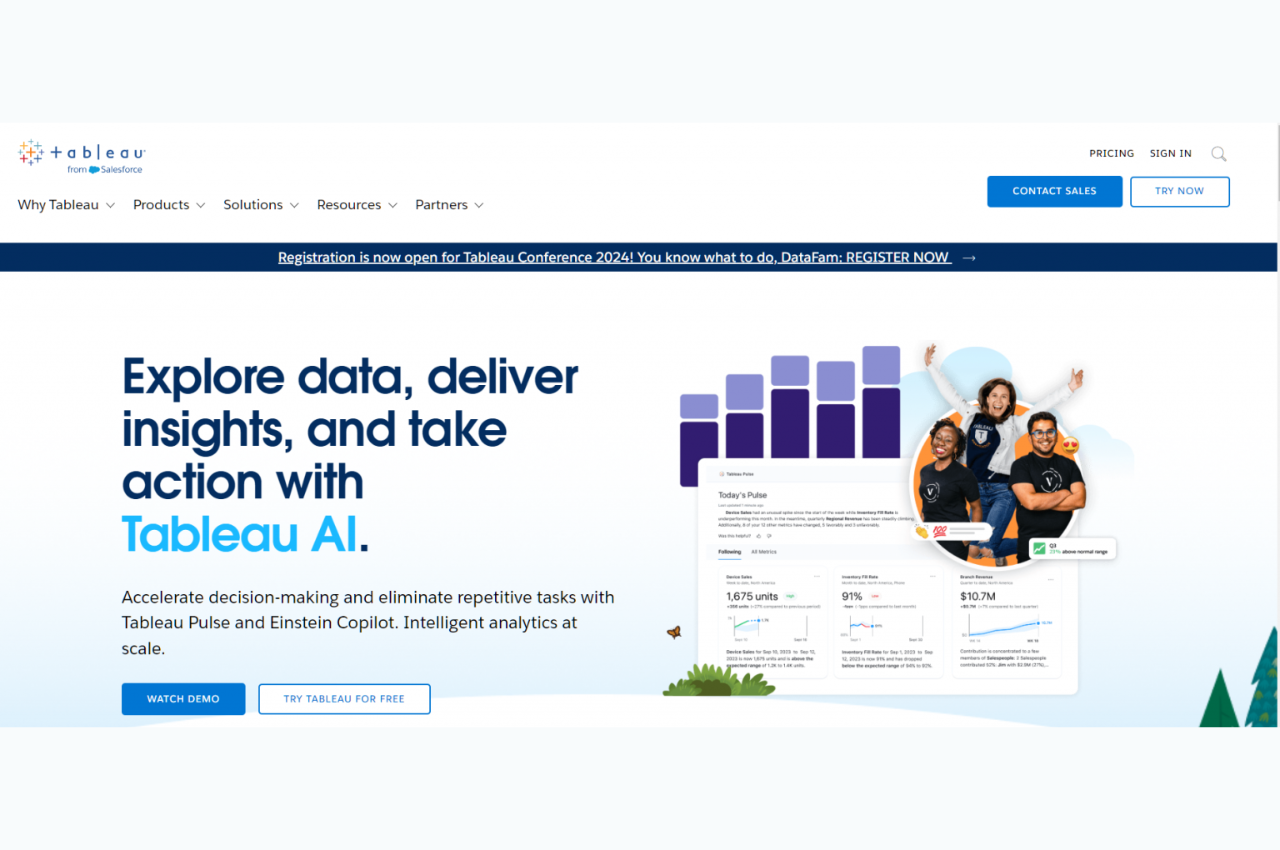 Tableau, a leading AI Data Analytics tool, has transformed the way businesses comprehend and utilize their data. By prioritizing accessibility, Tableau has integrated advanced AI capabilities throughout its platform, enabling users to harness predictive analytics and machine learning for informed decision-making. A standout feature of Tableau is Einstein Copilot, an intelligent assistant that automates data analysis, preparation, and governance, significantly expediting the time it takes to gain valuable insights. This tool enhances the productivity of data analysts by offering contextual assistance and automating repetitive tasks, ultimately improving the quality of visualizations and dashboards through prescriptive guidance.
Tableau, a leading AI Data Analytics tool, has transformed the way businesses comprehend and utilize their data. By prioritizing accessibility, Tableau has integrated advanced AI capabilities throughout its platform, enabling users to harness predictive analytics and machine learning for informed decision-making. A standout feature of Tableau is Einstein Copilot, an intelligent assistant that automates data analysis, preparation, and governance, significantly expediting the time it takes to gain valuable insights. This tool enhances the productivity of data analysts by offering contextual assistance and automating repetitive tasks, ultimately improving the quality of visualizations and dashboards through prescriptive guidance.
Einstein Copilot utilizes generative AI and statistical analysis to grasp the context of your data, propose relevant business inquiries, and jumpstart your analysis. It can bridge data gaps, enhance analysis by generating synthetic datasets when real data is limited, and predict outcomes using predictive analytics. This approach ensures an efficient, enlightening, and ethical methodology for data analytics, with a strong emphasis on privacy and security. Through Einstein Copilot, Tableau strives to democratize data analysis even further, granting powerful data insights to all individuals within an organization, regardless of their technical expertise.
Databricks
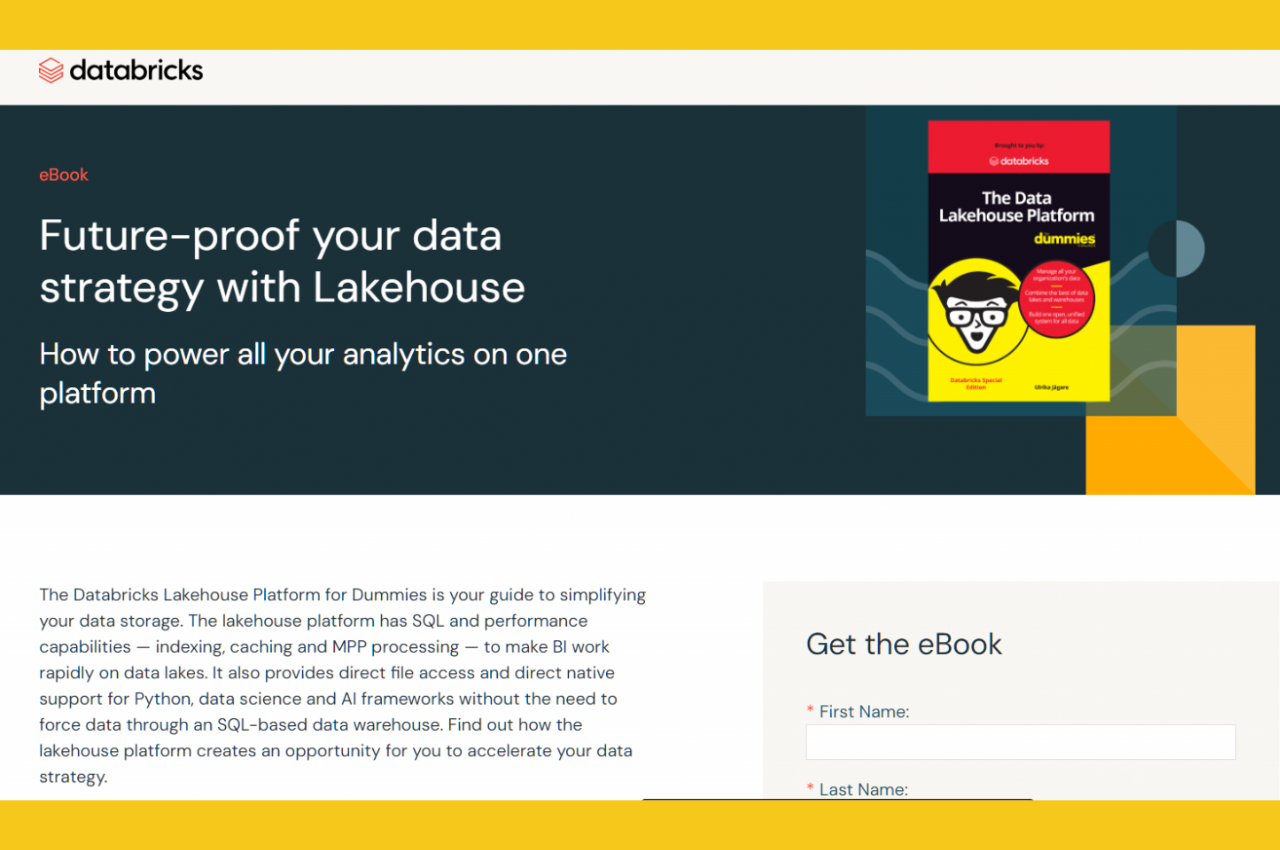 Databricks is a leading platform in the realm of big data and analytics, offering a state-of-the-art solution to streamline the analytics process for intricate data science endeavors. It is renowned for its unique ability to merge the capabilities of data warehouses and data lakes, resulting in an environment that is exceptionally well-suited for machine learning and AI initiatives. Its primary advantage lies in its robust capability to manage extensive data processing and analysis tasks, making it an essential tool for organizations seeking to leverage big data for a competitive advantage in their respective industries.
Databricks is a leading platform in the realm of big data and analytics, offering a state-of-the-art solution to streamline the analytics process for intricate data science endeavors. It is renowned for its unique ability to merge the capabilities of data warehouses and data lakes, resulting in an environment that is exceptionally well-suited for machine learning and AI initiatives. Its primary advantage lies in its robust capability to manage extensive data processing and analysis tasks, making it an essential tool for organizations seeking to leverage big data for a competitive advantage in their respective industries.
A standout feature of Databricks is its collaborative design, which fosters seamless teamwork among data scientists, engineers, and analysts. This collaborative setting ensures that diverse teams can collaborate effectively, breaking down barriers that often hinder data science projects. By providing a unified workspace, Databricks empowers these teams to access, analyze, and process data in real-time, promoting innovation and accelerating the discovery of valuable insights.
DataRobot
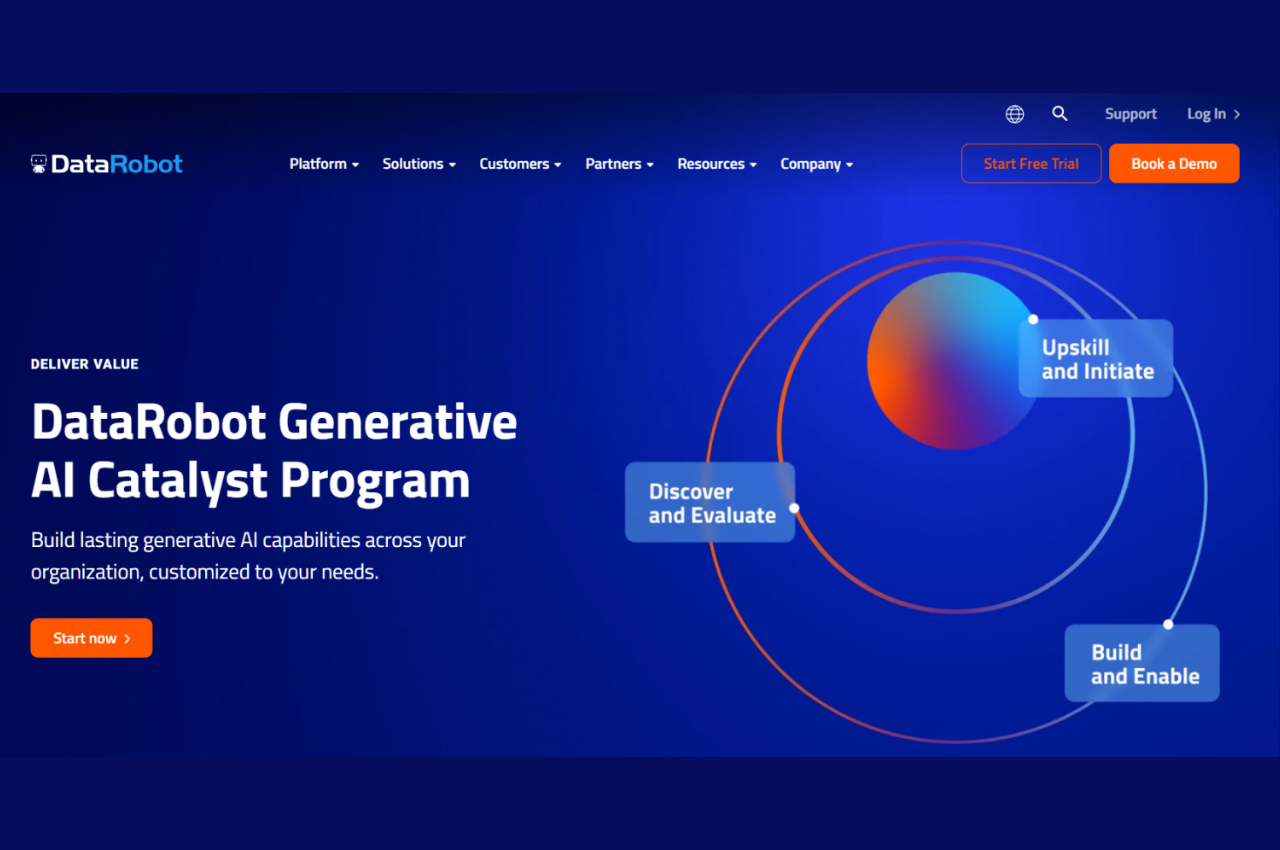 DataRobot is a top-tier AI Data Analytics tool that excels in providing value throughout the AI and machine learning lifecycle. Its unified platform merges generative and predictive AI to assist businesses in operating confidently, governing with transparency, and developing with flexibility. The platform is renowned for its capability to expedite AI deployment, significantly enhance return on investment, and reduce costs.
DataRobot is a top-tier AI Data Analytics tool that excels in providing value throughout the AI and machine learning lifecycle. Its unified platform merges generative and predictive AI to assist businesses in operating confidently, governing with transparency, and developing with flexibility. The platform is renowned for its capability to expedite AI deployment, significantly enhance return on investment, and reduce costs.
The DataRobot AI Platform is crafted to cater to a wide array of industries, such as manufacturing, retail, and financial services, making it adaptable for diverse business applications. It meets the requirements of cross-functional teams and users by integrating various data sources and offering the freedom to deploy AI solutions anywhere. This ensures that AI-powered decisions seamlessly integrate with existing business applications and services, like Snowflake, Salesforce, and ServiceNow.
The platform’s notable features underscore its dedication to democratizing access to the potential of AI. It provides a unified environment tailored to different user proficiencies and capabilities, enabling data scientists, analytics experts, business users, and IT professionals to collaborate efficiently. DataRobot handles all types of data from any source, consolidating data from disparate sources and formats to offer a comprehensive perspective that drives business success.
DataRobot’s AI Platform is recognized for its holistic approach to AI analytics, presenting a modular, flexible, and extensible framework that empowers organizations to innovate swiftly and adapt to evolving needs.
Salespanel
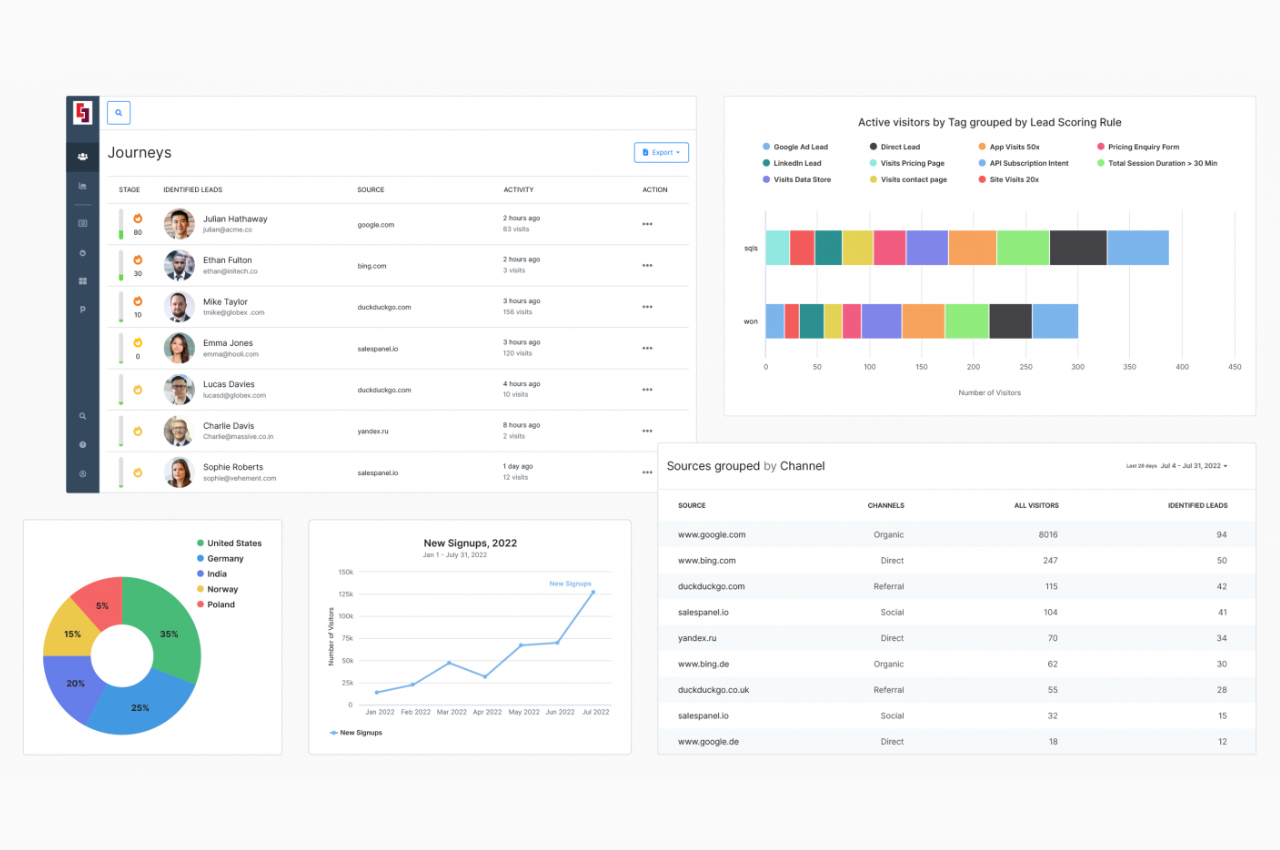 Salespanel is a specialized marketing AI data analytics tool catered specifically to B2B businesses. Its primary objective is to enhance decision-making, deepen customer insights, and refine marketing strategies through the utilization of visitor intelligence and data-driven analysis. The platform excels in the identification, tracking, and qualification of leads by integrating data from various sources such as websites, applications, forms, and CRMs. This comprehensive overview provided by Salespanel proves to be invaluable for sales and marketing teams.
Salespanel is a specialized marketing AI data analytics tool catered specifically to B2B businesses. Its primary objective is to enhance decision-making, deepen customer insights, and refine marketing strategies through the utilization of visitor intelligence and data-driven analysis. The platform excels in the identification, tracking, and qualification of leads by integrating data from various sources such as websites, applications, forms, and CRMs. This comprehensive overview provided by Salespanel proves to be invaluable for sales and marketing teams.
The approach taken by this product in marketing analytics is of utmost importance for B2B organizations. It plays a vital role in evaluating campaign ROI, optimizing strategies, and enriching customer experiences. Salespanel’s standout features include its capabilities in lead generation and qualification, real-time tracking, and marketing automation. These features ensure that sales and marketing efforts are closely aligned and executed efficiently.
Salespanel positions itself as an indispensable tool for B2B companies that aim to harness the power of data analytics. Its focus on real-time insights, comprehensive data integration, and predictive analytics equips businesses with the necessary tools to make well-informed decisions, optimize marketing efforts, and achieve exceptional ROI on their marketing investments.
Polymer Search
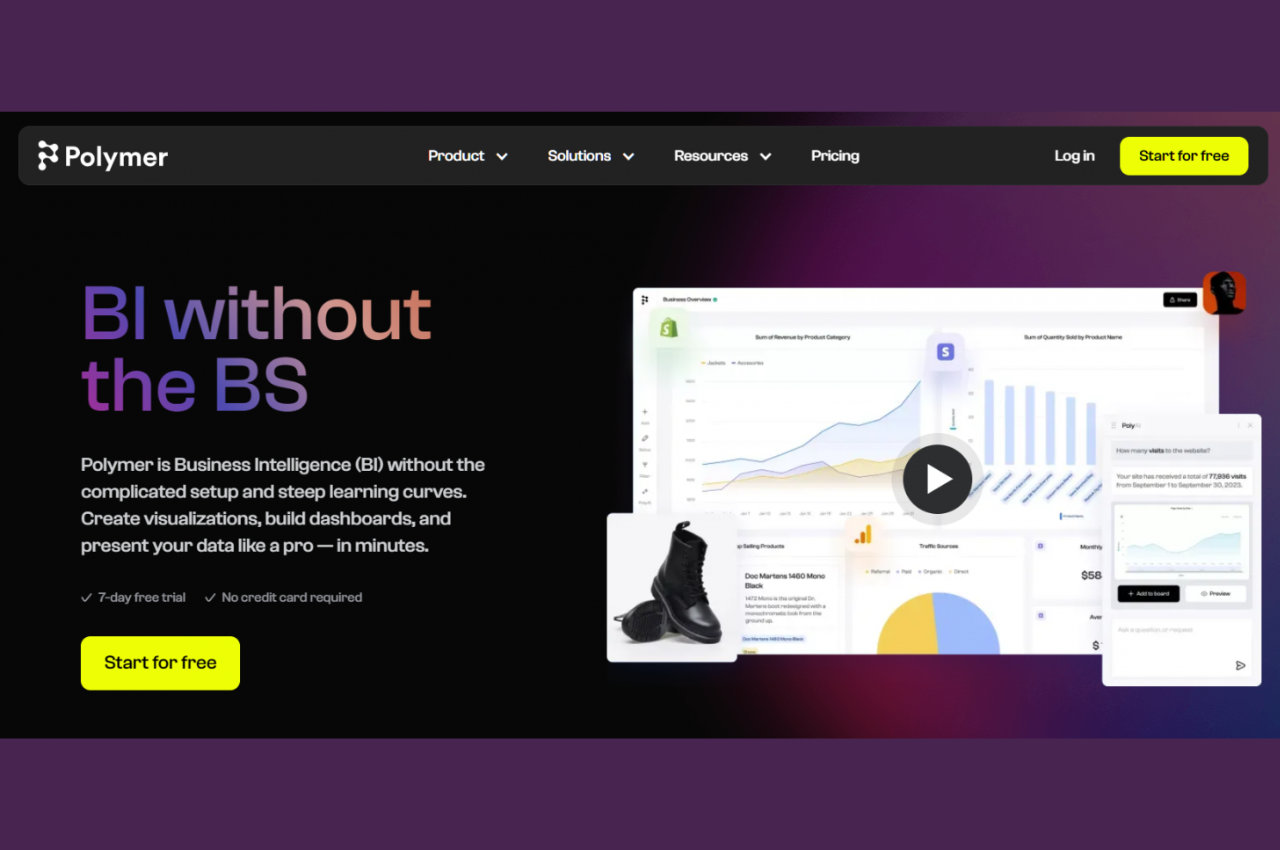 Polymer Search is a user-friendly Business Intelligence (BI) tool that simplifies the process of creating visually appealing data visualizations and detailed dashboards, as well as integrating data into presentations effortlessly. It is known for its ease of use, allowing for seamless data import from a variety of sources such as Google Sheets, Excel, and Facebook Ads. The AI capabilities of the platform aid in data analysis, providing valuable insights and automatically constructing attractive dashboards. Polymer is adaptable, catering to the analysis requirements of different departments within an organization, including marketing, sales, and operations, fostering a data-centric environment in businesses. With its cost-effectiveness and no-code approach, Polymer is a tool that is accessible to users of all technical backgrounds.
Polymer Search is a user-friendly Business Intelligence (BI) tool that simplifies the process of creating visually appealing data visualizations and detailed dashboards, as well as integrating data into presentations effortlessly. It is known for its ease of use, allowing for seamless data import from a variety of sources such as Google Sheets, Excel, and Facebook Ads. The AI capabilities of the platform aid in data analysis, providing valuable insights and automatically constructing attractive dashboards. Polymer is adaptable, catering to the analysis requirements of different departments within an organization, including marketing, sales, and operations, fostering a data-centric environment in businesses. With its cost-effectiveness and no-code approach, Polymer is a tool that is accessible to users of all technical backgrounds.
Microsoft Power BI
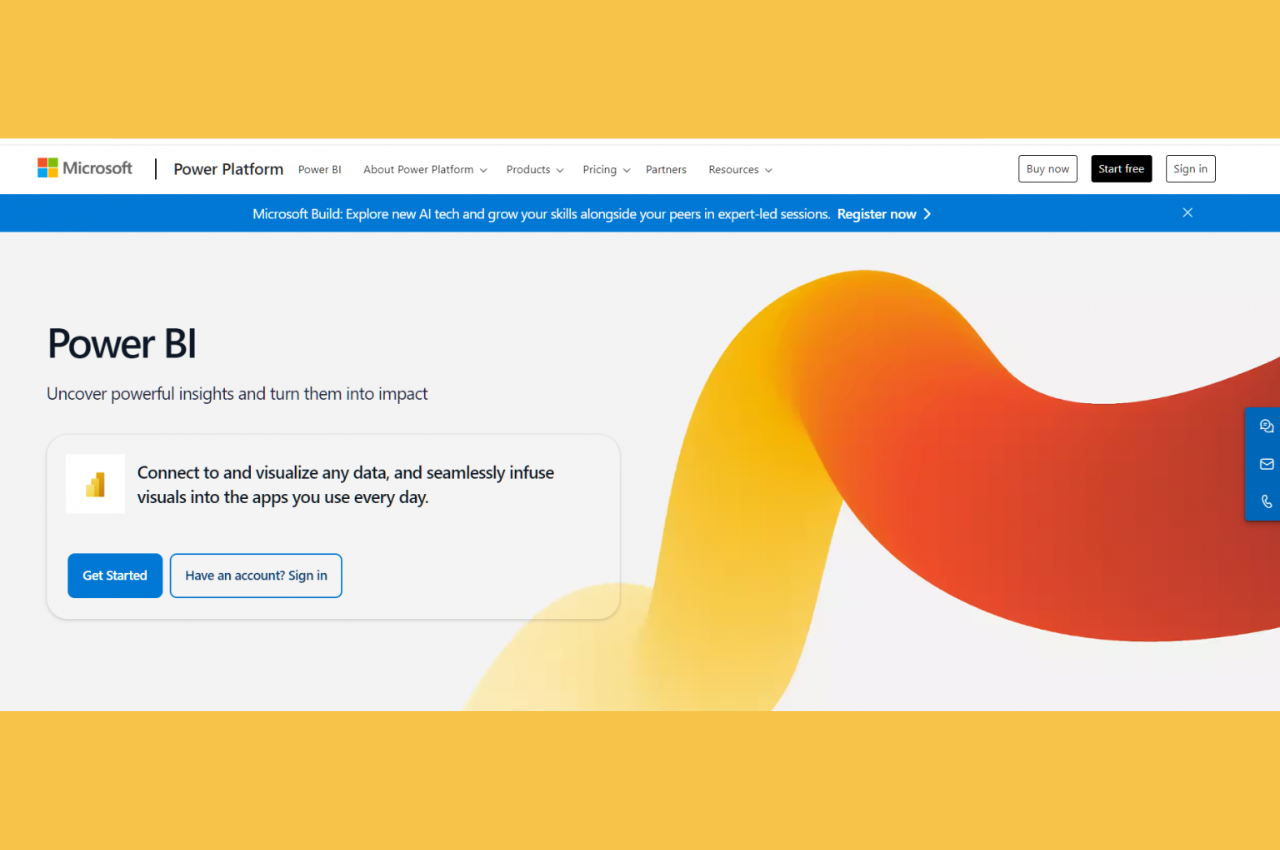 Microsoft Power BI is a powerful AI data analytics tool that boosts data analysis and visualization with advanced AI capabilities. It allows users to connect to different data sources, model and visualize data, and easily share insights across their organization. Power BI includes features like AI insights, offering access to pre-trained machine learning models for tasks such as sentiment analysis, keyphrase extraction, language detection, and image tagging within the Power Query Editor.
Microsoft Power BI is a powerful AI data analytics tool that boosts data analysis and visualization with advanced AI capabilities. It allows users to connect to different data sources, model and visualize data, and easily share insights across their organization. Power BI includes features like AI insights, offering access to pre-trained machine learning models for tasks such as sentiment analysis, keyphrase extraction, language detection, and image tagging within the Power Query Editor.
Power BI integrates Azure Machine Learning models created by data scientists, making these models readily available to business analysts. This integration encourages collaboration between data scientists and business analysts by simplifying the use of complex machine learning models through a user-friendly interface. Recent updates have introduced generative AI capabilities, such as leveraging GPT-3 to convert natural language into DAX, enhancing the tool’s ability to understand user queries and generate valuable data insights.
Additionally, Power BI supports self-service BI, empowering users to create and share reports with their colleagues. This fosters a data-driven decision-making culture within organizations. Users can get started with a free account or select from various licensing options, including Power BI Pro, to cater to their specific requirements. Power BI Desktop, a free application, further assists with data connection, modeling, and report generation.
Final Thoughts
In the current era of overwhelming data, the task at hand is not only to gather it, but also to harness its potential. This is where Artificial Intelligence (AI) comes into play, revolutionizing data analytics and transforming it from a daunting challenge into a valuable strategic asset. AI is reshaping the way we handle data, enabling us to not only manage its volume, complexity, and scale, but also take actionable insights from it.
AI goes beyond simply streamlining data analysis; it is a game-changer when it comes to uncovering patterns, delving deep into insights, and most importantly, predicting future trends. This predictive capability is priceless, providing businesses with the foresight needed to make informed decisions and stay ahead of the competition.
Leading the charge in this revolution are tools like Tableau, Salespanel, DataRobot, and Microsoft Power BI, among others. These tools are not just mere instruments, but catalysts for democratizing AI data analytics, making sophisticated analyses accessible across all levels of an organization. Whether it’s enhancing decision-making, refining marketing strategies, or forecasting market trends, these AI-powered tools are reshaping an AI data analytics landscape.
In today’s data-driven world, AI data analytics is not just a helpful tool—it is essential. It promises a future where data not only informs, but also guides strategic foresight, empowering businesses to anticipate changes and adapt with confidence.
Technocommy is a connecting space, the leading growth and networking organization for business owners and leaders. Do I qualify?


